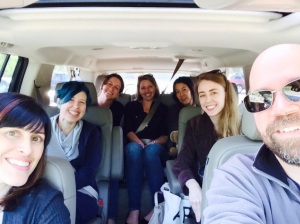
Last week 7 faculty and staff from Connecticut College took a road trip to Bryn Mawr for the Blended Learning in the Liberal Arts conference to present the Technology Fellows Program (TFP). During the two day conference, we learned a lot listening to the presentations, talking to each other and to colleagues at other institutions. Here are a few things we learned.
Anthony Graesch: I collected a handful of inspiring ideas across the various sessions, including some new ways of framing knowledge building in my curriculum. But I was most struck by the realization that it might take 10 Blended Learning Conferences to be the equivalent of one full cycle of the TFP. Only in its second year of operation, our TFP combination of workshops and seminars is resulting in a sustained conversation about the role(s) of digital technology in teaching and learning at Connecticut College. Over the last academic year, we’ve seen considerable growth in collaborations across the campus, with teaching-focused innovations being co-authored and implemented by faculty fellows, digital technologists, and librarians. One of our emergent goals (realized during our long drive to and from Philadelphia) is to make even more evident the products of these collaborations. Perhaps unsurprisingly, we aim to use digital technology to better achieve this goal!
Suzuko Knott: I was particularly excited to see so many panels dedicated to world language learning and the blended classroom. It was interesting to hear how other institutions are implementing technology in consortia to address issues of low course enrollments and student access to world language learning at schools with limited course offerings and resources. But more importantly, I was struck by how the conversations we have been having in the TFP are rooted in pedagogical best practices that will no doubt help us steer clear of many of the challenges we heard voiced at the conference. Synchronous online distance learning certainly has many great things to offer, but only when the pedagogical benefits outweigh the potential drawbacks – bad audio connections (a real problem for foreign language learning), stationary teachers, limited sense of community – that the technologically mediated classroom often has.
Jessica McCullough, Karen Gonzalez Rice & Lyndsay Bratton: We were all excited about the same presentation! Danny Jauregui, Associate Professor of Art at Whittier College creates digital worksheets in Moodle to accompany readings in his sophomore-level art theory course. He found that many students had difficulty critically engaging with the reading and that too much class time was given to explaining or summarizing readings. To solve this problem, he created “Critical Reading Worksheets” in Moodle that required students to answer a series of guiding questions for each reading. One question asked students to summarize the reading using 5-6 hashtags – requiring them to distill each reading into its main points – then order the hashtags in order of importance. This, along with word clouds he generated from their responses to this and other questions, formed the basis of a conversation about the readings. He discovered that students were better prepared to discuss readings, the tools helped place students at the center of the discussion instead of the professor, and that students appreciated using the worksheets.
Ann Marie Davis: This was my second time attending the conference. A year ago when I attended I was inspired to learn about the growing movement where faculty, staff, and administrators are exploring best practices for blended learning within the context of the liberal arts. As a Tech Fellow, I was especially inspired to learn from the examples and case studies that were presented by fellow colleagues at institutions similar to Connecticut College.
Diane Creede: Faculty at Smith College presented on their use of a software program called Knowledge Forum and how it enabled asynchronous online discussion and knowledge building. Their use of this tool got me to thinking about use of the online discussion forums in Moodle and how they might be used differently (better?). Students were instructed in specific practices for online (and offline) discussion that more effectively increased their knowledge. For instance, responding to other students posts by beginning with the phrase “Building on your comments,….”; or using direct quotes from course readings; or avoiding opinion-based posts, such as those that start with “I think…”.
